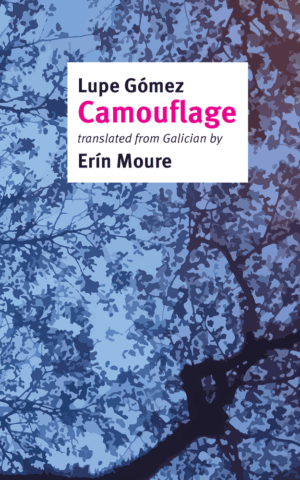In Their Own Words
Erín Mouré on translating Lupe Gómez's “Camouflage”

from Secret Energy
Camouflaged mom. Nest for birds.
Cuddle. Linguistic embraces.
I went seeking birds.
***
I love you, with my mute fingers.With butterflies of air I make you tatted lace.
With the blind power of my sad eyes
I rehearse a work of theater for you.
With my love I make you a forest.
I learn to listen to clouds, to till the earth, and to read heaven,
in your lap.
***
—You gave birth to me, and your man looked on in silence, bursting with happiness and trees. I brought electric shadows.—
***
You hollered,ate sops,
sipped Sanson fortified wine.
***
From your body mine was born,as if you were sharing
the mystery of magpies.
Translated by Erín Moure
All rights reserved. Reprinted with the permission of Circumference Books.
On translating Lupe Gómez's “Camouflage”
Camouflage is a hidden text that obscures nothing. It is a tender, beautiful, stubborn salute to Galician memory and life, a recognition of a poverty—povera—that is an avant-garde for it is both social and ecological, takes only what it needs, accumulates not cash but community. It allows a deploying of language that both condenses like black holes—which show us that the universe is other than us and (im)possibly plural—and refracts like mirrors—which show us we are here. In its refractions and condensations, the work resists the destruction of rurality and its community of use and relation by the forces of Capital.
And Camouflage is about the mother, figure of passion and life who is both hidden and visible in the pattern of community. In a recent interview, Lupe Gómez says:
When my mother died on January 20, 2013, a frigid Sunday night, a great fire was kindled on the mountain. It was an explosion of life, of energy, of dolorous birth. I don't see death as rendition, as resignation. It's neither passive nor "dead," for it serves to reactivate memory in those who remain alive. To me, death is a site of action. The whole village was snowbound when we laid my mother to rest, and I recalled a poem of Uxío Novoneyra's: "It snows to attenuate the world." I think Camouflage is a harder and more bitter book [than my earlier ones], but also more serene, more decanted, for it courses across all of life, and observes how the mother becomes old, yet in it I am no mere child of innocence and i 108 scars, scars and wounds, silently, little by little, like the rats that gnaw all night in our closet while we try to catch some sleep. [1]
In the poems of Camouflage, Gómez wields a deft minimalism and condensation of vocables, enunciating story with scant juxtaposed images and sounds, utterly uncluttered. Her poetry ignites both fact and affect in a tender and tenacious salute to what shores us up as beings-in-memory and thus in-the-present: our culture, nation, language, and the light that glows from each, illuminating us to one another.
As always, her work affirms the female body in all the difficulties it encounters living in the world, from which it doesn't shy away. A gorgeous book-long work of mourning, Camouflage is in tune with the ways of the ancient Kaddish and the prayers that accompany death in other religions in that it serves to praise life on the earth, showing us that this praise—and to be capable of affirmation even in the face of loss—is the highest work of humans. The challenge in translating Lupe Gómez is to retain her lightness, the feel of her words in the mouth and their echoes and relation, the gentle movement they propel, all without overcharging the text in English. It is a little delicate translating her work into English, for English is a language used to colonize—today it might be called "neo-liberal"— and as such it tends to absorb other languages. I try to translate without absorbing so as to respect and maintain Galician difference. It is critical, to me, to retain the performativity that reaches toward the reader and never appropriates the material of the poem. Rather, this material and the poem that results always retain the feeling of relationality—a feature they share with camouflage itself.
I didn't actually plan to translate Camouflage at all.
I only wanted to spend time inhabiting these poems I deeply loved, held in a book whose sinews and quiet unity drew me irrevocably and brought me close to my own maternal source. Translating was the way that I found to extend my reading, which so astonished me the first time I pored over the book, as in the book there were echoes for me of my own rural mother (though not rural, I am of a maternal rural caste, equal to the grasses and no more) and of Rosalía de Castro, flower of Galician language poetry in the 19th century, whom I have also translated. To honor the steadfast praxis of a rural mother is to understand poiesis itself and thus politics—politics and feminism, action and making, resistance to assimilation and decay.
What Gómez's poetry brings us is not property or proper. It is the inappropriable and exorbitant[2]—the body, women's bodies[3]— held momentarily in language which is all at once of the self and of the other and of what I call other-being, which is to say: being oneself because of being among others. Here in the regard of this other-being—in something that is relational and cannot be appropriated—we find community. Via community we learn and enact common use: that which is not owned but which unites us. On the contrary, if we only speak of and from ownership, from an ethos of accumulation—something we learn so well in Western society it is hard to think outside it—the common is camouflaged, vanishes. As critic Ramón Nicolás says,[4] Gómez makes the camouflaged visible by calling attention to its surroundings.
From the inappropriable to the held-in-common, then from the improper (a woman's body) to the "proper" (one's own use of language,[5] which is a non-appropriating and non-accumulative use as the language as a whole remains equally accessible to use by others): this is Lupe Gómez's incredible journey in the poem. She offers it to us, not as solace from grief, but as a manner in which to live.
[1] Interview with Lupe Gómez by Montse Dopico, "Lupe Gómez: 'Sentín que a miña voz era máis forte, máis fráxil e máis íntima que nunca: A morte é un lugar comprensivo'," Praza.gal, June, 2018. 109
[2] The way Rosalía de Castro in the 19th and I in the 21st century have both been exorbitant bodies in our translation practices, says María Reimóndez in Corpos exorbitantes: Rosalía de Castro, tradutora feminista, en diálogo con Erín Moure (Santiago: Servizo de publicacións USC, 2017).
[3] Julia Kristeva, Donna Haraway, and others have spoken in different ways since the 1970s of how a woman's body is "other" to and in excess of the social order of patriarchy (thus patriarchy tries, unsuccessfully, to absorb the female body, by means of violence in relationships and in the law).
[4] Ramón Nicolás, "Camouflage by Lupe Gómez," in the cultural section of La Voz de Galicia, April 28 2017.
[5] In the Merriam-Webster dictionary, this is the first meaning of the word "proper": "1a: referring to one individual only; b: belonging to one."! You have to refer to definitions 7 and 8 to see the word as meaning appropriate, correct, respectable.



